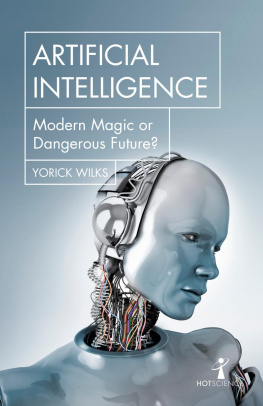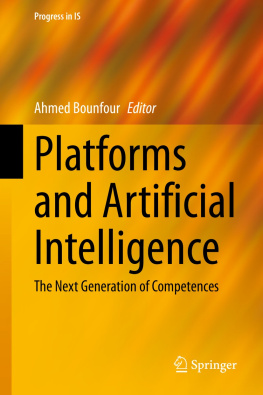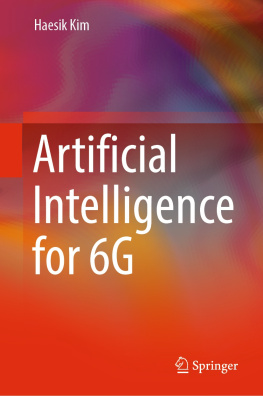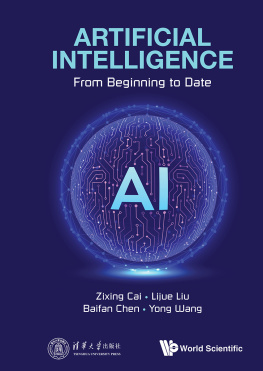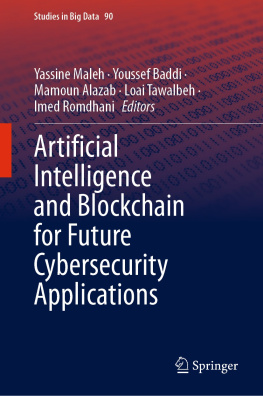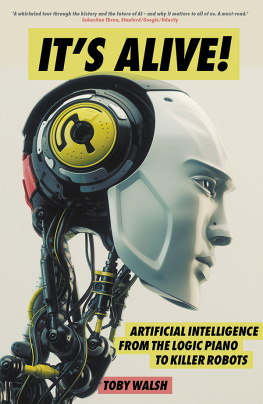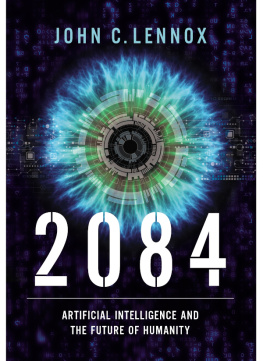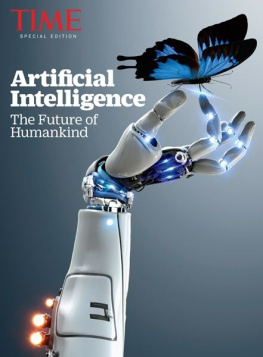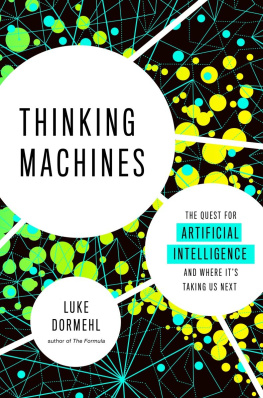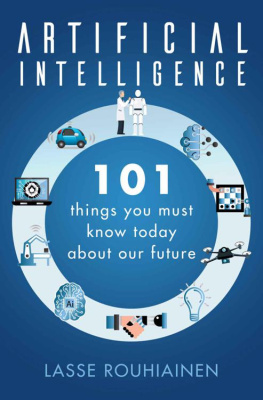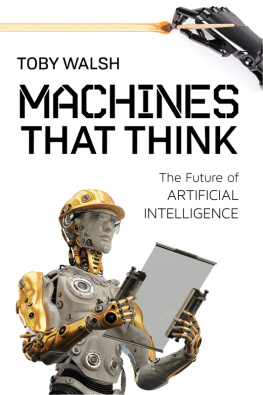Sachin Ramar - Artificial Intelligence: How it Changes the Future
Here you can read online Sachin Ramar - Artificial Intelligence: How it Changes the Future full text of the book (entire story) in english for free. Download pdf and epub, get meaning, cover and reviews about this ebook. year: 2019, publisher: Independently published, genre: Computer / Science. Description of the work, (preface) as well as reviews are available. Best literature library LitArk.com created for fans of good reading and offers a wide selection of genres:
Romance novel
Science fiction
Adventure
Detective
Science
History
Home and family
Prose
Art
Politics
Computer
Non-fiction
Religion
Business
Children
Humor
Choose a favorite category and find really read worthwhile books. Enjoy immersion in the world of imagination, feel the emotions of the characters or learn something new for yourself, make an fascinating discovery.

- Book:Artificial Intelligence: How it Changes the Future
- Author:
- Publisher:Independently published
- Genre:
- Year:2019
- Rating:5 / 5
- Favourites:Add to favourites
- Your mark:
- 100
- 1
- 2
- 3
- 4
- 5
Artificial Intelligence: How it Changes the Future: summary, description and annotation
We offer to read an annotation, description, summary or preface (depends on what the author of the book "Artificial Intelligence: How it Changes the Future" wrote himself). If you haven't found the necessary information about the book — write in the comments, we will try to find it.
Artificial Intelligence: How it Changes the Future — read online for free the complete book (whole text) full work
Below is the text of the book, divided by pages. System saving the place of the last page read, allows you to conveniently read the book "Artificial Intelligence: How it Changes the Future" online for free, without having to search again every time where you left off. Put a bookmark, and you can go to the page where you finished reading at any time.
Font size:
Interval:
Bookmark:
Artificial Intelligence
How It Changes the Future
By
Sachin Ramar
* * * * *
Copyright 2019
This book is available in print at most online retailers.
All rights reserved. No part of this publication may be reproduced or distributed in any form or by any means, electronic or mechanical, or stored in a database or retrieval system, without prior written permission from the publisher.
*****
Now days, we are all surrounded by modern interconnected devices. Those devices have access to the entire world, and they are as small as your palm. Just a few centuries ago, the ability to talk to someone thousands of miles away or produce a clear image of China while you are living in the United States was considered to be witchcraft. It is almost magical for people back then to think that it is possible for a group of people to talk face-to-face without being physically together. Now, these superpowers are taken for granted. Not many people can appreciate such wonders these technologies have brought to our lives. Technological advancement has brought us very far indeed. We made things a lot easier for us, for we are both social and lazy creatures. We discovered medicine and anatomy so surgeons can operate on patients and cure disease more effectively. Then, we thought that operating by hand is too hard, so we invented a device that helps surgeons operate on patients. We evolved from walking on four legs to two legs. Back then, legs were the best form of transportation, until we invented a way not to walk through the creation of iron horses (cars) and metallic tube that is heavier than air but can soar high like the birds. Now, it may sound even mundane to talk about how planes fly, but try to explain that to the people in the medieval age how they managed to get thousands of people around the globe in about three days and you can see their brain explode.
We cannot deny just how useful technology has been in our lives. As mentioned earlier, we have taken them for granted. We care less about how it works than what it does. Everything has its own price, after all. There are many examples in the past. Misuse of medicine leads to the evolution of horrendous diseases known as superbugs. People abuse drugs meant to relieve pain. Communication, while allowing a teenager to talk to his long-distance girlfriend thousands of miles away, takes him away from his family members sitting just feet away from him at the dinner table. Horses initially thought to be the best Wi-Fi you can have before the invention of telecommunication and cars, now became obsolete. Factory workers, fishermen, as well as farmers, are being replaced with machines at an alarming rate. They cannot compete against machines that can do a lot more work for a fraction of the cost both money and time-wise. Therefore, you cannot deny that technological advancement brings with itself the change in society and the way of life as a whole.
Among these advancements, one sparked a significant concern. artificial intelligence. Many old movies depicted how machines can turn against their own creators, and such references can be heard tossed around in many discussions about Artificial Intelligence. Sure, they were initially joking, but everyone cannot dismiss the fact that it could happen. On a more serious note, people saw what technology did to horses. People start to worry if they will be next on the technological chopping block. Certain famous figures such as Elon Musk and even Stephen Hawking also warned everyone about the development of artificial intelligence.
According to Stephen Hawking, AI development could be the worst event in the history of mankind civilization unless we find a way to control its development. He stressed the fact that, theoretically, computers can emulate humans intelligence and eventually exceed it. It is very possible when you think about it. Machines are not limited by physical biological barriers. They are only limited to the hardware that is installed, which can easily be upgraded for a boost in capacity much greater than that of biological evolution.
As it stands, AI lives among us. They are in smartphones; they help people find information; they also learn the behaviors of their owners and produce relevant contents to enhance their users experience and encourage them to continue using the device. Some people are actually right to be concerned when AI is deeply entrenched like this. In this book, we will discuss AI in detail, including its history, how it works, and how it influences the society.
*****
 The word itself consists of artificial and intelligence. Artificial is something that is simulated, not real, but also not fake in the sense of being a scam. The best way to describe artificial is by thinking of the grass used to cover the stadium ground. That is artificial grass, but it functions similarly to real grass. It is a lot easier to care for, more resistant and is widely used in many sports. The point is, artificial objects can be used instead of the genuine things because the former is better in certain situations. Intelligence is a complex term. You can say that it is the logic, self-awareness, learning, emotional knowledge, conscience, planning, creativity, the list goes on. Humans are the most intelligent species because we have something that all other animals lack. We can perceive our environment, comprehend, understand, and take actions based on what they learned. You can say that animals can do just the same to a certain degree. However, our brain evolved exponentially until we invented language to communicate better with others, as well as tools to interact better with our environment. We also invented weapons so we can climb up the food chain until we are at the top as the dominant species. Both humans and animals have natural intelligence. We develop this naturally through the tedious evolutionary process.
The word itself consists of artificial and intelligence. Artificial is something that is simulated, not real, but also not fake in the sense of being a scam. The best way to describe artificial is by thinking of the grass used to cover the stadium ground. That is artificial grass, but it functions similarly to real grass. It is a lot easier to care for, more resistant and is widely used in many sports. The point is, artificial objects can be used instead of the genuine things because the former is better in certain situations. Intelligence is a complex term. You can say that it is the logic, self-awareness, learning, emotional knowledge, conscience, planning, creativity, the list goes on. Humans are the most intelligent species because we have something that all other animals lack. We can perceive our environment, comprehend, understand, and take actions based on what they learned. You can say that animals can do just the same to a certain degree. However, our brain evolved exponentially until we invented language to communicate better with others, as well as tools to interact better with our environment. We also invented weapons so we can climb up the food chain until we are at the top as the dominant species. Both humans and animals have natural intelligence. We develop this naturally through the tedious evolutionary process.
While the existence of intelligence in plants is debatable, it is proven that they show their intelligence differently from humans or animals. Plants do not have a brain or any neural network, but they are still fully capable of reacting to their environment. A perfect example of this is a study in which a flower is grown inside a dark box with only a small hole through which sunlight could go through. As the flower grows, it leans toward the light, indicating that plants too can react to their environment although they do not have any nervous system. Intelligence observed in plants is an intriguing topic of its own because it is not as easily observed as that in humans or animals.
Now, there is another type of intelligence known as artificial intelligence. Broadly speaking, it is the simulation of human intelligence process using machines. Such intelligence is found in computer systems. AI has some characteristics similar to human intelligence such as planning, problem-solving, knowledge representation, motion, learning, and many other things. There are two main types of AI: narrow AI, and general AI.
Narrow AI is found in computers. These AIs learn and are taught to how to carry out specific tasks without being programmed explicitly how to do so. A perfect example is speech and language recognition capability in Siri, which is a virtual assistant in iPhones. Another example is the vision-recognition systems in self-driving cars or the AIs that works behind the curtain that delivers advertisement on websites that are relevant to viewers based on their search history and internet activities. These AIs are called narrow AI because they can only learn or taught how to do a specific task. Narrow AIs can do many things such as interpreting video feeds from surveillance drones or mundane tasks such as organizing personal and business documents. They are capable of responding to customers questions and coordinating with other AIs to book a hotel room at the right price and location. They have also been used in advanced applications such as spotting potential cancer tumors in X-rays, detect wear and tear in elevators or flagging inappropriate contents online.
Next pageFont size:
Interval:
Bookmark:
Similar books «Artificial Intelligence: How it Changes the Future»
Look at similar books to Artificial Intelligence: How it Changes the Future. We have selected literature similar in name and meaning in the hope of providing readers with more options to find new, interesting, not yet read works.
Discussion, reviews of the book Artificial Intelligence: How it Changes the Future and just readers' own opinions. Leave your comments, write what you think about the work, its meaning or the main characters. Specify what exactly you liked and what you didn't like, and why you think so.

